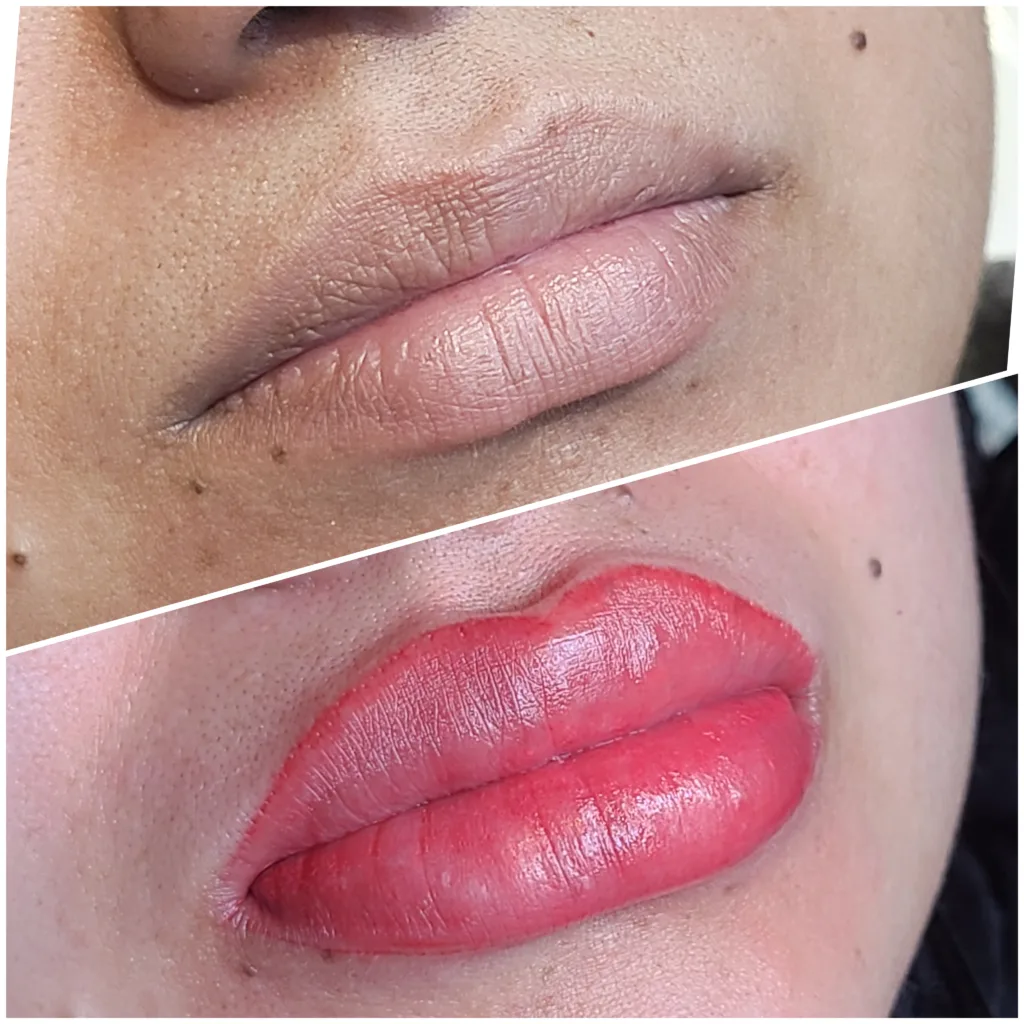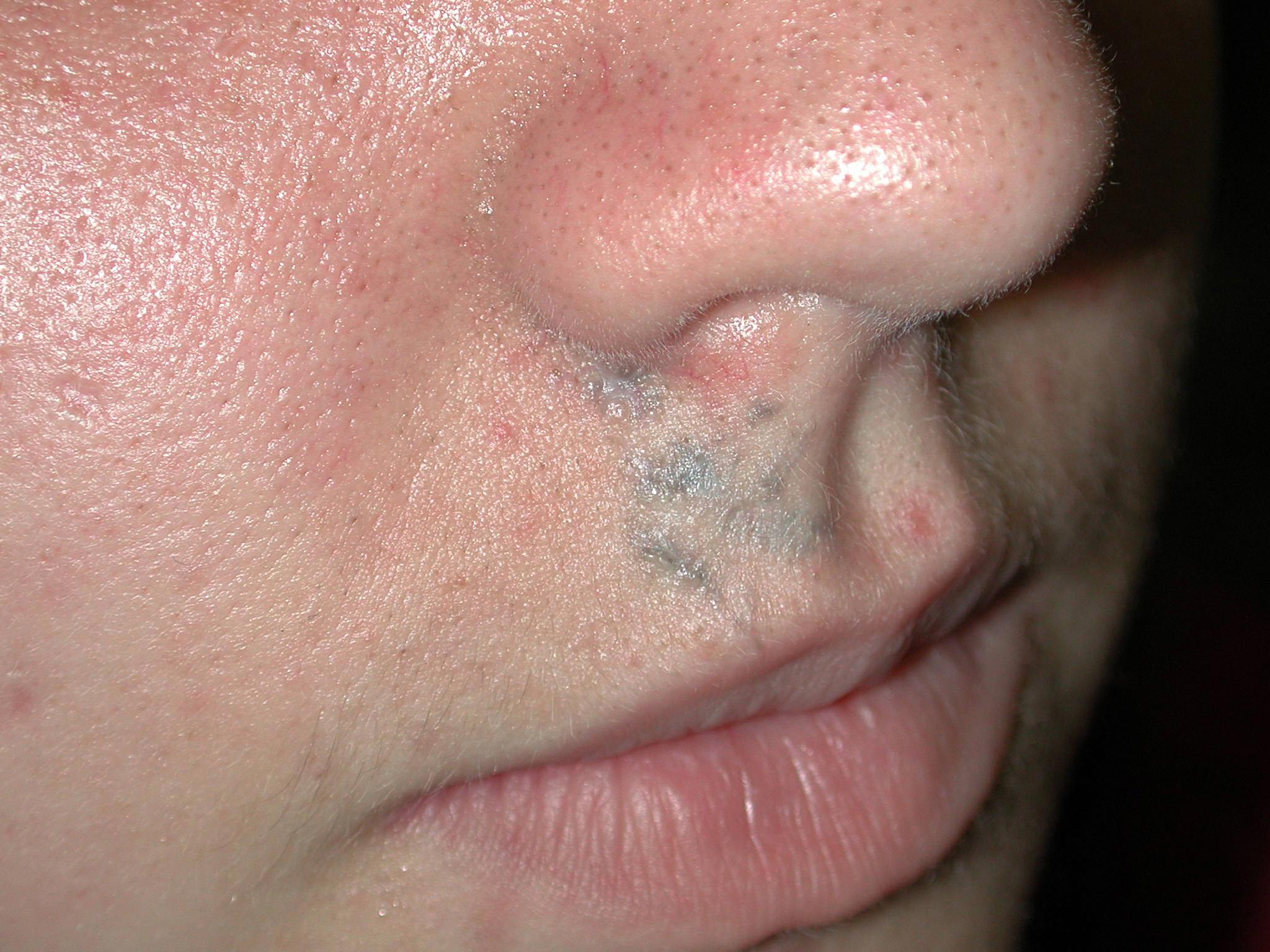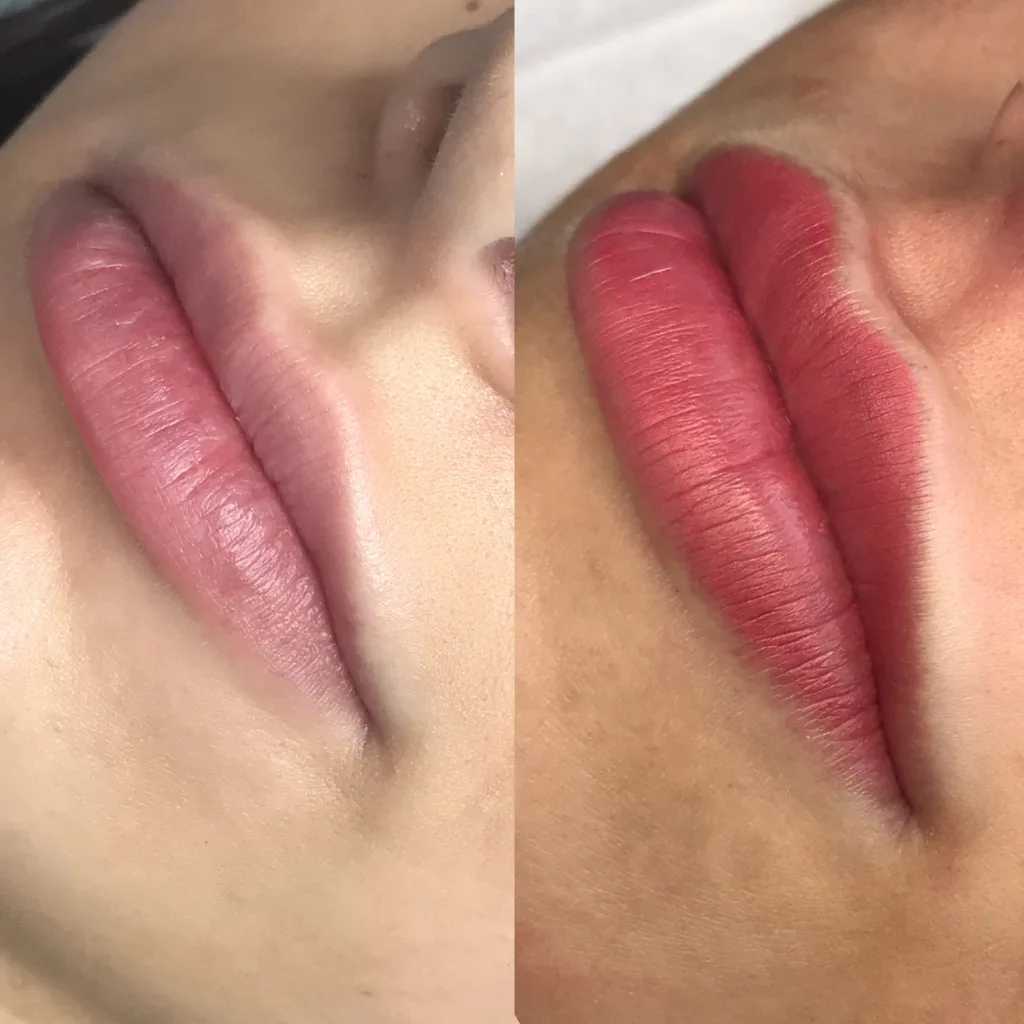Getting a tattoo can be a thrilling experience, but it’s also important to be aware of the potential pain and discomfort involved. This is especially true for lip tattoos since the lip area is particularly sensitive. In this blog post, we’ll explore the question of whether lip tattoos hurt, and what you can expect during and after the procedure.
First, let’s delve into the actual process of getting a lip tattoo. The tattoo artist will use a needle to inject ink into the skin of your lips. This process can be uncomfortable, and many people report feeling a stinging or burning sensation during the procedure. You may also experience some bleeding, as the needle penetrates the skin.
It’s worth noting that the pain level of a lip tattoo can vary depending on a number of factors. For example, some people have a higher pain tolerance than others, so what feels uncomfortable for one person might not be as painful for another. Additionally, the location of the tattoo on your lip can affect the level of pain you experience. Tattoos on the inside of the lip tend to be more painful than those on the outside, since the inside of the lip is more sensitive.
So, what can you do to minimize the pain and discomfort of a lip tattoo? First and foremost, it’s important to choose a reputable and experienced tattoo artist. They will be able to guide you through the process and help you manage any pain or discomfort. Additionally, you may want to cosider using a numbing cream or gel before the procedure. These products can help to dull the pain and make the experience more comfortable.
After your lip tattoo is complete, you’ll need to take good care of the area to ensure proper healing. This means avoiding hot, spicy, salty, and acidic foods for the first two weeks, as these can irritate the tattooed area. You should also avoid touching or picking at the tattoo, as this can impede the healing process. Finally, be sure to follow any aftercare instructions provided by your tattoo artist, such as using a healing ointment or keeping the area clean and dry.
It’s important to be aware that lip tattoos can be painful, but with the right preparation and aftercare, you can minimize any discomfort and enjoy your new tattoo. If you’re considering a lip tattoo, be sure to choose a reputable artist and discuss any concerns or questions you may have before the procedure. With a little bit of care and attention, you can rock a stunning lip tattoo with confidence!
Do Lip Tattoos Hurt More Than Other Tattoos?
Yes, getting a lip tattoo can be more painful than getting a regular tattoo in oter areas of the body. The skin on the lips is thinner and more sensitive than other parts of the body, which makes it more susceptible to pain during the tattooing process. Additionally, the lips are a highly vascular area, meaning there is an increased risk of bleeding during the procedure. It’s important to note that pain tolerance can vary from person to person, so some individuals may experience less discomfort than others. It’s recommended to discuss pain management options with your tattoo artist before the procedure and to properly follow all aftercare instructions to ensure proper healing.

How Long Do Lip Tattoos Last?
Lip tattoos are a relatively popular tattoo choice due to their unique placement and visual appeal. However, unlike tattoos on other parts of the body, lip tattoos tend to have a shorter lifespan. The reason for this is due to the rapid turnover of cells in the lip area, which causes the ink to fade and blur more quickly. On average, lip tattoos tend to last between one to five years before they begin to noticeably fade. It’s also worth noting that factors such as sun exposure, smoking, and excessive lip biting or licking can accelerate the fading process. While lip tattoos may not be as long-lasting as other tattoos, they still offer a unique and attractive option for those looking to express themselves throgh body art.
The Sensation of a Lip Tattoo
Yes, you can feel a lip tattoo. The process of getting a lip tattoo can be uncomfortable and painful, as the skin on the lips is thin and sensitive. The tattoo artist will use a needle to inject ink into the skin, wich can cause a stinging sensation. However, the level of discomfort varies from person to person, and some people may find the pain to be tolerable. Once the tattoo is healed, you may still be able to feel the texture of the tattoo on your lips. Overall, getting a lip tattoo is not a painless procedure, but the level of discomfort is manageable if you are prepared for it.
Eating After Getting a Lip Tattoo
Yes, you can eat after getting a lip tattoo, but it’s important to be cautious and follow some guidelines to promote proper healing. Firstly, it’s recommended to avoid hot, spicy, salty, and acidic foods for the first 2 weeks after getting a lip tattoo, as these can irritate the area and slow down the healing process. Instead, opt for softer, cooler foods like soup or yogurt. Additionally, it’s a good idea to drink liquids through a straw for the first 3 days to minimize contact with the tattooed area. When eating, try not to constantly wipe your lips with a napkin or lick your lips, as this can also impede healing. By follwing these guidelines, you can ensure that your lip tattoo heals properly and lasts as long as possible.
Preparing for a Lip Tattoo
Preparing for a lip tattoo is very important to ensure that the procedure goes smoothly and the results are satisfactory. Here are some steps that you should follow to prepare for a lip tattoo:
1. Choose a reputed and experienced tattoo artist who specializes in lip tattoos. Do your research and read reviews online before finalizing an artist.
2. Avoid consuming alcohol, aspirin, or any blood-thinning medication at least 24 hours before the appointment. This will reduce the risk of excessive bleeding dring the procedure.
3. Keep your lips moisturized and well-hydrated by drinking at least 8-10 glasses of water per day. Avoid using lipsticks for 72 hours before the appointment as they tend to dry out the lips. Instead, use a hydrating lip balm like Aquaphor.
4. Schedule your appointment when you have some free time to rest and recover. Lip tattoos can cause some discomfort and swelling, so it’s best to avoid any strenuous activities or social events immediately after the procedure.
5. Discuss the design and color of the tattoo with your artist beforehand and make sure you are both on the same page. It’s also important to inform the artist about any allergies or medical conditions you may have.
6. Finally, make sure you follow the aftercare instructions provided by your artist to ensure that your lips heal properly and the tattoo lasts a long time. This may include avoiding certain foods and drinks, keeping your lips moisturized, and avoiding direct sunlight.

What to Avoid After Getting a Lip Tattoo
After getting a lip tattoo, there are several things that you should avoid doing to ensure proper healing and to prevent any potential complications. Firstly, it is recommended that you avoid exposing your lips to the sun, sweating, steam, and swimming for at least 48 hours, ideally 7 days. This is because these activities can cause excessive moisture and irritation to the tattooed area, which can lead to infection and poor healing.
Additionally, it is important to avoid kissing, eating spicy foods, drinking hot drinks, or applying ice directly to your lips for a few days after the procedure. These actions can cause irritation and inflammation to the area, which can delay the healing process and even cause the tattoo to fade or bcome distorted.
It is also essential to follow any aftercare instructions given by your tattoo artist, which may include applying a healing ointment or cream to the area, avoiding certain foods or beverages, or refraining from smoking or drinking alcohol for a certain period of time.
Overall, it is crucial to take proper care of your lip tattoo to ensure optimal healing and long-lasting results. By avoiding certain activities and following aftercare instructions, you can help ensure that your lip tattoo heals properly and looks beautiful for years to come.
Average Cost of Lip Tattoos
Lip tattoos are becoming increasingly popular, and the average cost for this treatment in the US is $590. It is important to note that prices can vary widely, with some treatments costing as little as $300 or less, while others can be as expensive as $1800. The final price will depend on a variety of factors, such as the location of the tattoo studio, the experience of the artist, and the complexity of the design. It is always recommended to do thorough research before selecting a studio or artist to ensure that you are receiving quality service at a fair price.
Brushing Teeth After Lip Tattoo
Yes, you can brush your teeth after getting a lip tattoo, but you need to be careful not to disrupt the healing process. It is recommended to wait at leat 24 hours before brushing your teeth. When you do brush, make sure to seal your lips with an ointment to protect the tattoo and place cotton balls in the gum area to avoid rubbing the lips. Also, avoid using whitening toothpaste during the healing process, as it can irritate the tattooed area. It is essential to maintain proper oral hygiene to avoid any infections or complications, but it is equally important to take precautions to ensure that the tattoo heals correctly.
How Long Should You Wait to Kiss After Getting a Lip Tattoo?
After getting a lip tattoo, it is recommended that you avoid kissing, rubbing, or any kind of friction on your lips for at last 10 days. This is important because, during this time, your lips are still healing and any kind of pressure or irritation can cause the pigment to be lost, leading to an uneven or faded result. It is also important to note that even after the 10-day period, it is advisable to be cautious with your lips for the first few weeks. You may experience dryness on your lips for up to 3 to 6 months, depending on your body’s reaction to the tattoo. Therefore, it is vital to keep your lips moisturized and avoid any activities that may cause irritation or damage to your newly tattooed lips.

Source: dermatologyadvisor.com
The Bleeding Effects of Lip Tattoos
Yes, lip tattoos can bleed during and after the procedure. This is becuse the skin on the lips is thinner and more delicate than other areas of the body, and it has a lot of blood vessels. However, bleeding is usually minimal and can be controlled by the tattoo artist using a sterile towel or gauze. After the procedure, it is normal for the lips to be swollen and tender, and there may be some bleeding or oozing of ink and bodily fluids. This is why it is important to follow the aftercare instructions provided by the tattoo artist to minimize the risk of infection or other complications. Overall, lip tattoos can be a great way to enhance the appearance of the lips, but it is important to be aware of the potential risks and to choose a reputable and experienced tattoo artist to perform the procedure.
The Pain Level of Lip Blushing
Lip blushing typically involves minimal pain, with some describing it as a mildly uncomfortable sensation. However, everyone’s pain tolerance is different, and some individuals may experience more discomfort than others. To alleviate any discomfort, a topical anesthetic is applied to the lips for around 20 minutes before the procedure to numb the area. The technician then draws the desired shape of the lips. Overall, lip blushing is considered a relatively painless procedure.
Where Are the Least Painful Areas for Tattoo Placement?
When it comes to geting a tattoo, the level of pain can vary depending on the location on your body. The least painful places to get a tattoo tend to be areas of your body with fewer nerve endings. These areas include the outer shoulder, calf, buttocks, and outer arm. These spots tend to be less sensitive to pain because they have a thicker layer of skin and fewer nerve endings.
However, it’s important to keep in mind that pain tolerance is different for everyone. What may be painful for one person may not be for another. Additionally, the size and intricacy of the tattoo can also impact the level of pain. Generally, larger tattoos can be more painful as they require longer periods of time under the needle.
In summary, the least painful places to get a tattoo are areas of your body with fewer nerve endings such as the outer shoulder, calf, buttocks, and outer arm. Pain tolerance can vary from person to person, and the size and intricacy of the tattoo can also play a role in the level of pain experienced.
Things to Avoid Before Getting a Lip Tattoo
Before getting a lip tattoo, there are a few thngs that you should avoid doing to ensure the best possible outcome. Firstly, you should avoid consuming alcohol for at least 24 hours before your appointment. Alcohol can thin the blood, making the skin more sensitive and prone to bleeding or bruising during the procedure. Additionally, you should refrain from taking any blood-thinning medications, such as aspirin, ibuprofen or fish oil tablets, for at least 72 hours before your appointment. These medications can also increase the risk of bleeding and bruising during the procedure. By avoiding these things, you can help ensure that your lip tattoo is successful and that the healing process goes smoothly.

The Risk of Infection with Lip Tattoos
Yes, inner lip tattoos can be more prone to infection compared to othr areas of the body due to the high levels of bacteria present in the mouth. Any tattoo carries a risk of infection, and this risk is increased when the tattoo is in a location that is difficult to keep clean and dry, such as the inside of the lip. In addition to the risk of infection, other potential risks of lip tattoos include an allergic reaction to the ink, swelling, rashes, or scarring. It’s essential to take proper care of your tattoo after getting it to minimize the risk of infection and ensure proper healing. This includes keeping the area clean and dry, avoiding wearing tight clothing that may rub against the tattoo, and following any aftercare instructions provided by the tattoo artist.
Can I Wear Lipstick After Getting a Lip Tattoo?
Yes, you can wear lipstick after getting a lip tattoo. However, it is recommended that you wait at last a week to let your lips fully heal before applying any lip products. This is because the tattooed area needs time to scab and peel off naturally, and applying lipstick too soon may disrupt the healing process and cause irritation or infection.
Once your lips have healed, you can wear lipstick as usual. However, it is important to choose a lipstick that is gentle on the skin and won’t cause any irritation or allergic reactions. Avoid matte or long-wearing lipsticks, as these can be drying and may cause the tattooed area to fade over time.
To keep your lip tattoo looking fresh and vibrant, it is important to moisturize your lips regularly and protect them from the sun. You can also touch up your lip tattoo as needed to maintain its color and shape. Overall, wearing lipstick after a lip tattoo is perfectly fine, as long as you take proper care of your lips and follow the aftercare instructions provided by your tattoo artist.
Conclusion
In conclusion, gettng a lip tattoo can be a painful experience, and it’s important to know what to expect beforehand. While the pain threshold varies from person to person, it’s common to experience stinging-like pain during the process, as well as some bleeding. It’s also essential to take proper care of your tattoo during the healing process, which can take up to two weeks. Additionally, it’s important to note that lip tattoos tend to last only one to five years due to the rapid turnover of cells in the lip area. Therefore, it’s crucial to weigh the potential pain and temporary nature of the tattoo before deciding to get one.
